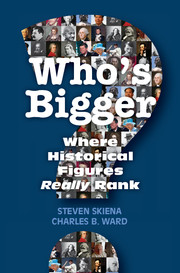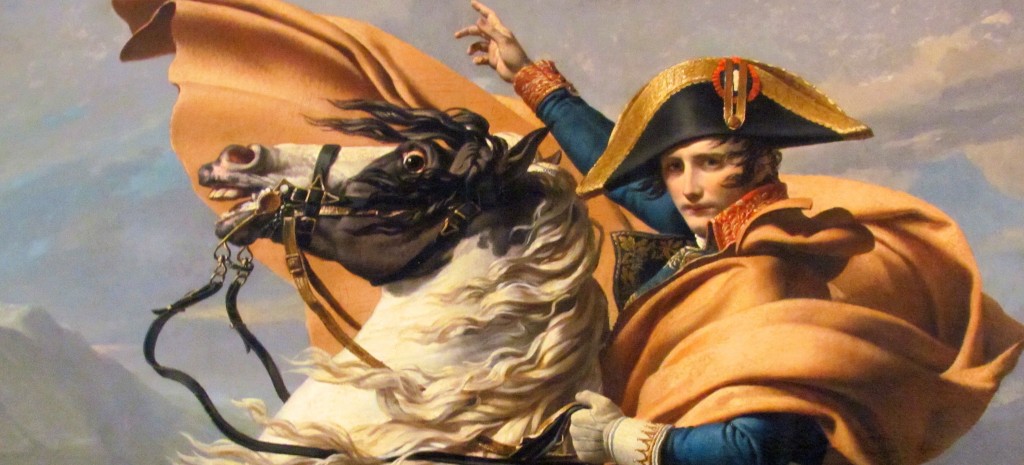One hundred ninety-three years after his death, Napoleon Bonaparte still matters. According to a scientifically rigorous study, published by the Cambridge University Press, Napoleon ranks second to Jesus Christ as the most influential person in history. William Shakespeare comes in third.
Study authors, Steven Skiena of State University of New York at Stony Brook and Charles Ward of Google, Inc., based the results primarily on Wikipedia page rankings. Who had the longest article? How often was it edited? How often visited? They then refined the analysis to take into account current celebrity versus historical “gravitas.” For more detail, you can read their book WHO’S BIGGER? To get a quick overview, watch Steven Skiena’s YouTube video below.
We can argue about the methodology and the criteria used in this study. Indeed, some might contend that it’s Napoleon’s notoriety rather than his benevolence that gained him recognition. I’d respond that Napoleon was the world’s first great meritocratic leader. But should he rank above Thomas Jefferson and George Washington?
 Like those Founding Fathers, Napoleon came to power when old regimes were giving way to new ideas. After France’s revolution, Europe teetered on the verge of anarchy. Napoleon steadied it, pulling France back from bankruptcy, installing new laws, establishing educational systems for the masses, and reestablishing free practice of religion.
Like those Founding Fathers, Napoleon came to power when old regimes were giving way to new ideas. After France’s revolution, Europe teetered on the verge of anarchy. Napoleon steadied it, pulling France back from bankruptcy, installing new laws, establishing educational systems for the masses, and reestablishing free practice of religion.
Then, driven by the conservative forces of European aristocracy, Napoleon plunged into a war-filled abyss. In the end, that upstart Corsican shed his humble origins to recast himself as the leader of a new autocratic dynasty.
Yet he preserved the best of the French revolution: the opportunity for the least of us to rise to the top of the heap. In his words, when it comes to individuals “the outcome is more important than the origin.” We tend to forget how revolutionary that idea was. It remains one of Napoleon Bonaparte’s great legacies.


Thanks for posting this. I had not heard about it. As always you have written a considered and thought provoking piece.
I was reminded of the comment by A.J.P. Taylor as long ago as 1969: “There are more books about Napoleon than about any other human being (a phrase carefully chosen in order to rule out Jesus Christ).”
I may blog about this myself, I hope you don’t mind, but if so I shall certainly put in a link to your blog.
best wishes
John
Hello
My gr.gr.gr…grandfather Charles Gunnell of the 20th Reg. of Foot was one of those who buried Napoleon back in 1821. Would anyone have a list of those soldiers who carried his coffin?
Thank you
David
Thanks, John. Happy to have you spread the word. And always appreciate a link back. Take care! Margaret
Hello, David. Thanks for the comment. I don’t have any information about that, but what a great Napoleonic family connection that is! You might try contacting Albert Benhamou: https://www.lautresaintehelene.com/other-st-helena-index.html
He’s very knowledgeable about the people who were on St Helena during Napoleon’s time. If nothing else, he might have another source for you to follow.
Pingback: Finding Napoleon in Richmond, Virginia (and Spain) » Finding Napoleon
Pingback: Finding a Bonaparte in Panama - Finding Napoleon
Pingback: Finding a Bonaparte in Panama - Margaret Rodenberg
🇫🇷
Ok so William Shakespeare is more relevant in History than Giulius Cesar? or Carl Marx? Or Lenin? Or Cristoforo Colombo? Or Galileo Galilei? Or Copernicus? Or Martin Luther? Or the prophet Mohammad?
Good to hear that.
I get your point. I’m not the author of that list so I’m not going to defend it, except to say that I love that a playwright, particularly Shakespeare, is considered that important.
I loved your article, thank you. I used you as a reference on a college paper about Napoleon.
Glad to help out! Wishing you the best with your studies.
Margaret